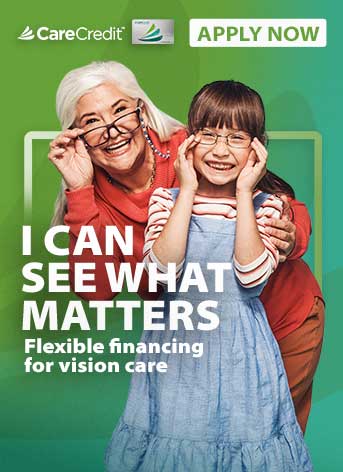If you've ever been told by an eye care professional that you need to wear eyeglasses or contact lenses, odds are that your particular vision problem was explained. But medical eye terms can seem complicated, and it's not unusual to arrive home after your eye exam feeling confused. Need a little clarity? Check out the mini glossary below for some insight about sight!
Common types of eye problems and what they mean
- Refractive errors are vision conditions that cause images to appear out of focus. These include nearsightedness, farsightedness, astigmatism and presbyopia. These vision conditions are usually corrected by eyeglasses, contact lenses or laser corrective surgery.
- Nearsightedness, also known as myopia, is a vision condition where objects up close appear clear, while objects far away appear blurry.
- Farsightedness, also known as hyperopia, is a common type of refractive error where distant objects may be seen more clearly than objects that are nearby. However, people can experience farsightedness differently. For people with significant farsightedness, vision can be blurry for objects at any distance.
- Astigmatism is a condition in which the eye doesn’t focus light evenly onto the retina, resulting in images appearing blurry and stretched.
- Presbyopia is an age-related vision condition that affects most adults over age 35, making it difficult to read small print and focus up close. Glaucoma, cataracts and macular degeneration are other vision conditions that typically affect older adults.
Signs and symptoms of refractive errors, or other eye problems:
- Blurry vision
- Headaches
- Haziness
- Eye strain
- Squinting to see objects close up or far away
- Glare around bright lights
- Difficulty seeing in low light
Will drugstore reading glasses help me read smaller print?
If you find yourself squinting at a text message or wondering why the entree options on a menu appear blurry, it might be tempting to consider buying an inexpensive pair of reading glasses from your neighborhood drugstore. These "readers," as they're called, work fine for some people but not for everyone. So if you find yourself unable to clearly make out the tiny directions on a medicine bottle, make an appointment with your eye care provider for an eye exam, then decide whether "readers" or prescription eyeglasses are right for you.
Reading glasses vs. prescription glasses:
- One-size-fits-all reading glasses do not work well for people who have a different prescription in each eye.
- For people who don't normally need vision correction but on rare occasions need help focusing, readers are often adequate.
- If you require strong vision correction, prescription glasses are the best choice to meet your vision care needs.
- If you wear readers every day, prescription strength glasses are probably a better choice for the long term, because they last longer and provide better vision that's tailored to your needs.
Schedule regular eye exams to help prevent eye problems
Whether or not you show signs of refractive errors or other vision conditions, like glaucoma or cataracts, scheduling regular eye exams is an important part of detecting and preventing vision problems. Don’t hesitate to ask your vision care provider to explain a vision term or an eye condition in detail if you don’t fully understand what something means.
Did you know? The CareCredit credit card is an easy way to pay for eye exams, glasses, contact lenses, eye care products and more.* Use the Acceptance Locator or download the CareCredit Mobile App to find a vision care provider near you that accepts CareCredit.








